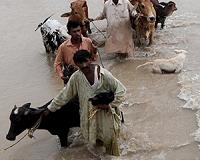| . |  |
. |
Zhouqu, China (AFP) Aug 11, 2010 Rescuers racing against a potential new deluge on Wednesday hurried to drain an unstable lake formed by China's worst mudslides in decades, as the death toll surged past 1,100. More than 10,000 soldiers and rescuers combed through the mountains of mud that buried a remote area of the northwest province of Gansu at the weekend, killing 1,117 people by the latest count and leaving more than 600 others missing. But the window of survival was fast closing, with only two survivors found on Wednesday, so authorities have focused on averting further devastation in the form of new floods and possible disease outbreaks. With days of heavy rains forecast from Wednesday -- sparked in part by Typhoon Dianmu, which ravaged South Korea -- troops were using excavators and explosives to clear debris blocking the Bailong river that runs through Zhouqu. The rubble has created a lake that, if it were to burst, could bring further destruction to areas already levelled by the avalanche of sludge and rocks, though officials insisted the risk had been minimised. "The danger of the barrier lake collapsing suddenly has been basically eliminated," the vice-minister of water resources, Jiao Yong, told a press conference in Beijing. Provincial authorities have nevertheless evacuated areas near the lake, the official Xinhua news agency reported. A stream of rescuers trudged through the zone, bearing the dead on stretchers, an AFP correspondent witnessed early Wednesday. Carts of coffins were seen at the roadside. At least a dozen bodies were laid out at a makeshift morgue in the heat, awaiting identification. Most were covered, but one was out in the open. The stench was overwhelming, causing some residents to gag and others to run past. Rescuers plucked a 50-year-old man from a flooded hotel in the barrier lake on Wednesday, and Xinhua later said another survivor had been found buried in debris, without giving further details. Hundreds of medical workers have been sent to the disaster zone along with experts in epidemic prevention amid fears of an outbreak of water-borne disease, but so far no such problems have been reported, a health ministry official said. Loudspeakers in town broadcast messages instructing residents how to protect themselves from disease. Tens of thousands of people were without adequate food and drinking water, as many roads leading to the area were damaged, leaving much-needed supplies stuck on trucks. Residents, on foot, carried goods in baskets on their backs. "The amount of traffic is much higher than before, so all roads leading to Zhouqu are congested, which has negatively impacted the smooth progress of relief work," said Yang Yongzhong, head of the Gansu transport department. One volunteer told AFP it was hard to find safe ground to erect tents. The mudslides are the latest in a string of weather-related disasters, as China battles its worst flooding in a decade. More than 2,100 people were left dead or missing and 12 million evacuated before the Gansu tragedy. The mudslides levelled an area five kilometres (three miles) long and 300 metres wide, Xinhua said. Floodwaters up to three storeys high have submerged half the county, where one-third of the population is Tibetan. The landslides swept homes, cars and debris into the Bailong, choking off the waterway and triggering flooding in the mountainous area. In Zhouqu town, workers tried to clear streets buried in thick mud and debris from more than 300 destroyed homes, but some residents wailed, hoping the bodies of their loved ones could still be found for burial. "It's hard to stop searching and let them down," Ren Tianwen, commander of hundreds of armed police in the zone, told Xinhua. Officials defended their efforts to warn residents of impending natural disasters, saying Zhouqu was particularly susceptible. "The area has been one of the key regions monitored by the local government," Guan Fengjun, a senior water resources ministry official, told a press conference in Beijing.
Share This Article With Planet Earth
Related Links Bringing Order To A World Of Disasters When the Earth Quakes A world of storm and tempest
 Pakistan issues fresh flood warning, calls for cash
Pakistan issues fresh flood warning, calls for cashSukkur, Pakistan (AFP) Aug 11, 2010 Pakistan issued fresh flood warnings on Wednesday, putting parts of Punjab and Sindh on alert and calling on foreign donors to step up efforts to contain the country's worst humanitarian disaster. The United Nations was to launch an international appeal in New York, calling for hundreds of millions of dollars to provide urgent assistance to six million people it says now depend on aid for su ... read more |
|
| The content herein, unless otherwise known to be public domain, are Copyright 1995-2010 - SpaceDaily. AFP and UPI Wire Stories are copyright Agence France-Presse and United Press International. ESA Portal Reports are copyright European Space Agency. All NASA sourced material is public domain. Additional copyrights may apply in whole or part to other bona fide parties. Advertising does not imply endorsement,agreement or approval of any opinions, statements or information provided by SpaceDaily on any Web page published or hosted by SpaceDaily. Privacy Statement |